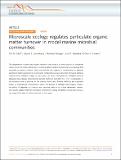Microscale ecology regulates particulate organic matter turnover in model marine microbial communities
Author(s)
Enke, Tim Niklas; Leventhal, Gabriel Etan; Metzger, Matthew; Saavedra, José T.; Cordero Sanchez, Otto X.
DownloadPublished version (757.0Kb)
Publisher Policy
Publisher Policy
Article is made available in accordance with the publisher's policy and may be subject to US copyright law. Please refer to the publisher's site for terms of use.
Terms of use
Metadata
Show full item recordAbstract
The degradation of particulate organic matter in the ocean is a central process in the global carbon cycle, the mode and tempo of which is determined by the bacterial communities that assemble on particle surfaces. Here, we find that the capacity of communities to degrade particles is highly dependent on community composition using a collection of marine bacteria cultured from different stages of succession on chitin microparticles. Different particle degrading taxa display characteristic particle half-lives that differ by ~170 h, comparable to the residence time of particles in the ocean's mixed layer. Particle half-lives are in general longer in multispecies communities, where the growth of obligate cross-feeders hinders the ability of degraders to colonize and consume particles in a dose dependent manner. Our results suggest that the microscale community ecology of bacteria on particle surfaces can impact the rates of carbon turnover in the ocean.
Date issued
2018-07Department
Massachusetts Institute of Technology. Department of Civil and Environmental EngineeringJournal
Nature Communications
Publisher
Springer Science and Business Media LLC
Citation
Enke, Tim N., et al. "Microscale ecology regulates particulate organic matter turnover in model marine microbial communities." Nature Communications, 9 (2018): 2743. © 2018 The Author(s).
Version: Final published version
ISSN
2041-1723